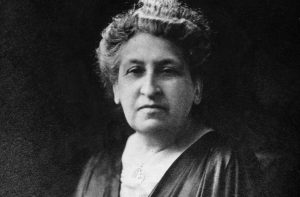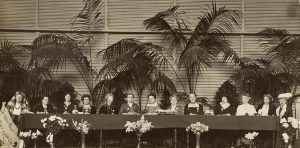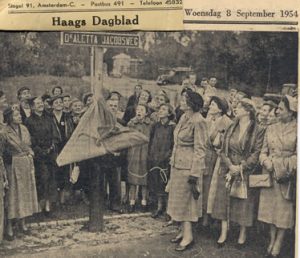Aletta Jacobs (1854-1929)
“Fortunately, I had never doubted my actions; otherwise I might indeed have followed their advice. But I was too deeply influenced by what I had seen and by my belief that this work would benefit humanity”
Born in February 1854 to a large Jewish middle-class family in the small village of Sappemeer in rural Netherlands, Aletta Jacobs is not only remembered as an ardent feminist, suffragette and pacifist, but also an advocate for women’s birth control rights and sexual health. Aletta Jacobs became the first female doctor in the Netherlands in 1878 and eventually opened the world’s first birth control clinic. Ignoring her critics, Jacobs refused to follow the gender conventions of the time, which would have limited herself to the profession of a midwife, instead she decided to study medicine and after she got her doctoral degree in medicine set up an independent medical practice. Her experiences in her medical practice, motivated her to become more active for women’s rights, advocating not only for better working conditions for working-class women and women’s right to safe birth control, but also demanding equal right in family and marriage and economy, society and politics. She served as the president of the Dutch Women’s Suffrage Association for sixteen years until the passage of women’s suffrage in 1919.
Aletta Jacobs wanted to become a medical doctor since she was young and refused to be deterred when local schools and universities rejected her application based on her gender. With the help of her progressive father, a respected country doctor himself, she was authorized by the Dutch Minister of Education to attend the University of Groningen in 1871. She finally received her doctorate in 1878 and opened her own practice, where she worked in all areas of the medical field, much to the dismay of her male colleagues. A quickly growing number of women flocked to her practice. So, she opened another clinic dedicated to issues of birth control, which was free of charge and dedicated to the poor.
Her birth control clinic was harshly critiqued by the public and Jacobs herself was harangued by fellow physicians who were ignorant to its benefits and viewed her public information about issues of birth control as “disgusting.” Jacobs, however, not only continued to treat these women’s medical needs but also began to advocate on their behalf. Working with her impoverished patients, she became aware of the health complications arising from twelve hour-workdays with no breaks and prostitution work, both of which these women depended on for survival. This inspired her to lobby for female workers’ rights and educate the public on venereal disease and the importance of birth control. She lobbied for the rights of young female workers after noticing the toll extreme hours took on their bodies, calling for a reduced workday and improved working conditions. Although ignored at first by the government, Dutch laws regarding the workday were changed in 1902, restricting labor to a maximum of 11-hour shifts and mandating breaks of at least one hour.
Her work with destitute women reignited her passion for women’s rights and in 1882, Jacobs joined the still small Dutch suffrage movement. After being refused to register to vote despite fulfilling the Dutch voters law as a taxpayer, Jacobs brought her case to her region’s Court of Appeal. Although her case was rejected, her work did not go unnoticed and the fledgling Dutch Women’s Suffrage Association reached out and invited her to become a member. In 1883, Dutch women were explicitly banned from voting, adding the word “man” in the constitution of 1887. This antifeminist political act further increased the growth of a suffrage movement in the Netherlands. Jacobs became a very active member of this movement and was elected as president of the Association soon, a position she would hold until 1919. In 1904 she became in addition the first leader of the International Women Suffrage Alliance (IAW), founded in the same year in Berlin.
Alette Jacob was also an ardent internationalist and pacifist. She tried to keep the international bonds of women going, after the First World War started in August 1914. As a citizen of the neutral country the Netherlands, she was well positioned to try to keep the conversation between women leaders in different war powers and even enemy countries going. In April 1915, she organized together with the German feminist and pacifists Anita Augspurg and Lida Gustave Heinemann the International Women’s Congress in The Hague with over 1,100 delegates from several countries. The congress established an International Committee of Women for Permanent Peace (ICWPP) with the American suffragist Jane Addams as president. The ICWPP became in 1919 the Women’s International League for Peace and Freedom (WILPF) dedicated to peace and women’s equal citizenship. In this forum, which brought together more than a thousand women from all over the world, the first feminist proposals against the war and violence rooted in 20th century Europe began to formulate. Still today, WILPF is one of the women’s network with the most impact in international politics. This organization is considered the most important of women for peace in the last century, and Jane Addams, its first president, received the Nobel Peace Prize in 1931.
In 1919, Aletta Jacobs finally stepped down from her leadership position in the Dutch Women’s Suffrage Association, after Dutch women received the right vote. She continued to travel the world and publish writings on topics like contraception and her international women’s issues. She frequently attended international conferences like the International Alliance of Women and the Women’s International League for Peace and Freedom. She continued working for the feminist cause until her death in Baarn, the Netherlands, on the 10 of August 1929 at age 75 years.
Aletta Jacobs’ life highlights the value of simple determination. Jacobs fought her way through life: into and through university, in the medical field, and against societal oppression of women in the nineteenth and twentieth centuries. Ultimately, her work paid off, resulting in the availability of birth control, women’s suffrage, and a decrease in the length of the workday in the Netherlands. A more widespread knowledge and recognition of Aletta Jacobs’ life and work would serve as an inspiration for women around the world advocating for change.
Rachel Arenas, Exercise and Sports Science, Class of 2018
Sources
Literature and Websites
- “Jacobs, Aletta.” Encyclopedia of Women Social Reformers, at: https://search.credoreference.com/content/entry/abcwsr/jacobs_aletta/0 (accessed 15 April 2018).
- “Jacobs, Aletta.” Oxford Reference, at: http://www.oxfordreference.com/view/10.1093/acref/9780195148909.001.0001/acref-9780195148909-e-523 (accessed 15 April 2018).
- “Jacobs, Aletta.” The Palgrave Macmillan Dictionary of Women’s Biography, at: https://search.credoreference.com/content/entry/macdwb/jacobs_aletta/0 (accessed 15 April 2018).
- Jacobs, Aletta. Memories: My Life as an International Leader in Health, Suffrage, and Peaceö New York: The Feminist Press, 1996.
Images



